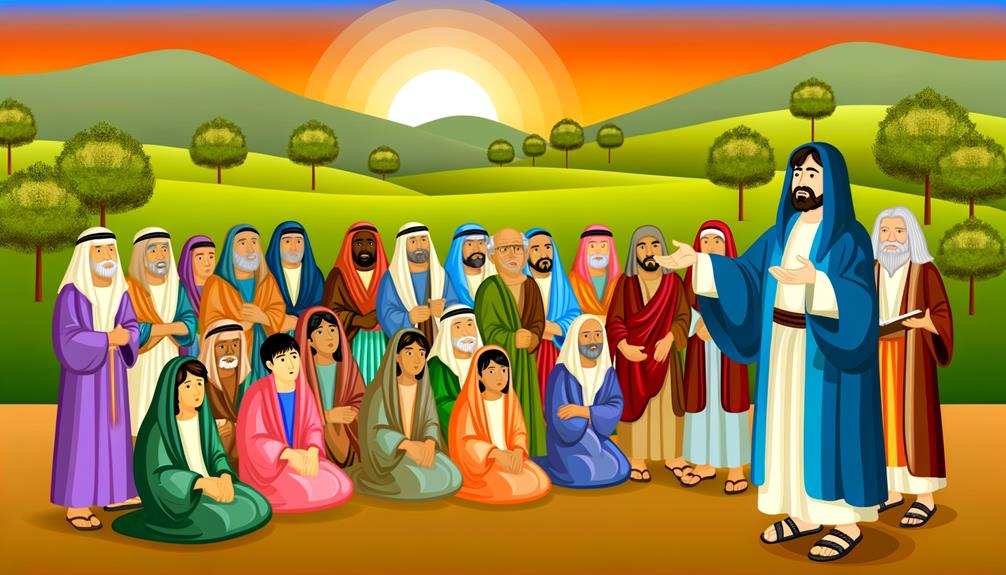Justice In The Bible Meaning: Righteousness and Fairness
Justice in the Bible is deeply rooted in a covenantal framework that integrates divine law, moral order, and ethical behavior, transcending mere legalism to promote community welfare and righteousness. Prophetic literature and Jesus’ teachings emphasize protecting the marginalized and correcting societal wrongs, linking true worship with ethical conduct.
Parables highlight equity and restorative justice, redefining fairness across societal boundaries. These principles are further embodied in Mosaic Law and the practices of the early church, underscoring the synthesis of justice, mercy, and social responsibility.
Exploring deeper reveals the thorough nature of biblical justice and its enduring relevance.

Justice in the Bible: Meaning, Divine Principles, and Spiritual Significance
| Aspect | Details |
|---|---|
| Term | Justice (Hebrew: Mishpat, Greek: Dikaiosyne) |
| Core Meaning | Righteousness, fairness, moral order |
| Biblical References | Micah 6:8, Isaiah 1:17, Amos 5:24, Matthew 23:23 |
| Rooted In | God’s character and covenant law |
| Human Responsibility | Treat others with fairness, uphold truth, defend the vulnerable |
| Spiritual Symbolism | Reflects God’s kingdom, moral integrity, and divine judgment |
| Application Today | Social justice, personal integrity, and ethical living |
Old Testament Foundations

The concept of justice in the Old Scripture is deeply rooted in the covenantal relationship between God and the people of Israel, emphasizing both divine law and moral order. This foundational understanding of justice is encapsulated within the framework of the covenant, which mandates adherence to God’s commandments and ethical living.
Justice, consequently, is not merely legalistic but integrally tied to righteousness and community welfare. The prophetic literature further underscores this, with prophets like Isaiah and Amos advocating for social justice and equitable treatment of the marginalized.
Accordingly, Old Covenant justice is both a divine imperative and a societal obligation, reflecting a holistic vision where religious devotion and ethical conduct coalesce to form a just society.
Justice in Mosaic Law

Mosaic Law provides a thorough framework for justice, intertwining legal statutes with ethical mandates to guarantee both individual and communal righteousness. This extensive legal system, encompassing the Pentateuch, addresses various aspects such as property rights, criminal offenses, and social welfare.
Through laws like the Ten Commandments, the Law establishes fundamental moral principles, emphasizing integrity, fairness, and compassion. Additionally, it prescribes restitution and proportionate punishment, aiming to restore social harmony and deter wrongdoing.
The inclusion of provisions for the marginalized—widows, orphans, and foreigners—reflects a profound concern for equity and social justice. By integrating divine commandments with civil regulations, Mosaic Law fosters a holistic approach to justice, ensuring that ethical conduct underpins legal adherence.
Prophetic Calls for Justice

Throughout the Hebrew Bible, prophets vehemently advocate for social justice, often confronting systemic injustices and calling for societal reforms grounded in divine principles.
Figures such as Isaiah, Jeremiah, and Amos serve as moral compasses, explicitly condemning corruption, exploitation, and inequality. They emphasize that true worship of God cannot be separated from ethical conduct towards fellow humans.
Amos, for instance, famously declares, “Let justice roll down like waters, and righteousness like an ever-flowing stream” (Amos 5:24).
These prophetic messages extend beyond mere religious observance, demanding tangible actions to correct societal wrongs. Their calls for justice are intrinsically linked to covenantal faithfulness, underscoring that adherence to God’s law necessitates active pursuit of equity and compassion.
Jesus and Righteousness

In the New Scriptures, Jesus’ teachings and actions serve as a profound embodiment of righteousness, emphasizing the inseparability of justice and divine love.
His ministry was marked by a radical redefinition of societal norms, advocating for the marginalized and oppressed.
Jesus’ Sermon on the Mount, for instance, underscores a vision of justice that transcends legalistic interpretations, urging adherents to embody mercy, humility, and compassion.
The Beatitudes highlight the blessedness of those who hunger for righteousness and seek peace.
Additionally, Jesus’ interactions with societal outcasts, such as tax collectors and sinners, illustrate his commitment to restorative justice, revealing a theological framework where righteousness is intrinsically linked to love, forgiveness, and the pursuit of equitable relationships.
Parables of Justice

The parables of Jesus serve as profound illustrations of justice, emphasizing lessons in fairness, equity, and forgiveness.
Through narratives such as the Parable of the Workers in the Vineyard and the Parable of the Unforgiving Servant, Jesus elucidates the principles of divine justice that transcend human understanding.
These parables challenge conventional perceptions of justice by highlighting the importance of mercy and equity in the administration of righteousness.
Jesus’ Fairness Lessons
Among the most compelling teachings of Jesus, the parables of justice serve as profound illustrations of fairness and equity in the moral and social order.
For instance, the Parable of the Workers in the Vineyard (Matthew 20:1-16) challenges conventional notions of fairness by illustrating God’s grace and generosity that transcends human merit.
Similarly, the Parable of the Good Samaritan (Luke 10:25-37) redefines neighborly love and justice by highlighting compassion beyond ethnic and social boundaries.
These narratives not only elucidate divine justice but also call for a transformative understanding of human relationships.
Jesus’ use of parables consequently provides a nuanced approach to justice, urging listeners to reflect deeply on ethical principles and societal norms.
Equity in Parables
Exploring the concept of equity within Jesus’ parables reveals a profound reconfiguration of justice that challenges traditional societal hierarchies and expectations.
Parables such as the Workers in the Vineyard (Matthew 20:1-16) and the Good Samaritan (Luke 10:25-37) illustrate a divine justice that transcends human norms.
These narratives emphasize:
- Inclusivity: Justice is extended to all, irrespective of societal status or merit.
- Compassion: Mercy and benevolence are core components of equitable justice.
Forgiveness and Justice
Forgiveness within biblical justice, as illustrated by parables such as the Prodigal Son (Luke 15:11-32), underscores a transformative vision of justice that prioritizes restoration and reconciliation over retribution.
This parable illuminates the profound interplay between forgiveness and justice, portraying a father’s unconditional acceptance of his repentant son.
The narrative shifts the focus from punitive measures to the healing of relationships, embodying a divine justice that is restorative rather than merely corrective.
In this scenario, forgiveness becomes a significant component of justice, reflecting a moral and theological imperative to restore communal harmony.
Such paradigms challenge conventional understandings of justice, encouraging a nuanced appreciation of how biblical texts advocate for a justice that heals and reunites.
Justice and Mercy

The interplay between justice and mercy in the Bible reveals a profound theological tension that underscores the complexity of divine law and human morality. This duality is evident in numerous biblical narratives where God’s justice is tempered by His mercy, reflecting a divine balance.
For instance, the story of King David illustrates this tension as he faces consequences for his sins but also receives forgiveness.
Key aspects of this dynamic include:
- Divine Compassion: God’s mercy often mitigates the full extent of deserved punishment.
- Human Repentance: Genuine repentance can invoke divine mercy.
This synthesis of justice and mercy exemplifies the intricate moral framework within biblical teachings.
Protecting the Vulnerable

Building upon the biblical interplay between justice and mercy, the scriptures also emphasize a profound commitment to protecting the vulnerable, underscoring a moral obligation that runs throughout the text.
This commitment is evident in numerous passages that highlight the protection of widows, orphans, and strangers. Specifically, the following table illustrates key instances where this principle is articulated:
| Vulnerable Group | Biblical Reference | Core Message |
|---|---|---|
| Widows | James 1:27 | True religion involves caring for widows. |
| Orphans | Psalm 82:3 | Defend the cause of the fatherless. |
| Strangers | Leviticus 19:34 | Treat the stranger as a native. |
These injunctions reflect a broader theological framework wherein justice is inseparable from compassion and societal responsibility.
Social Justice in Scripture

While examining the concept of social justice in scripture, it becomes evident that biblical texts offer a nuanced and multifaceted understanding of justice, emphasizing the equitable treatment and inclusion of all individuals within the community.
The Bible underscores social justice through various mandates and narratives that call for fairness and compassion. Key aspects include:
- Equity: Biblical laws often underscore the importance of treating everyone fairly, regardless of their social status.
- Protection of the Marginalized: Scriptures emphasize safeguarding the rights and well-being of the poor, widows, orphans, and foreigners.
These principles reveal a thorough approach to social justice, advocating for systemic fairness and collective moral responsibility.
Justice in the Early Church

Exploring the ethos of justice within the early church reveals a continuation and expansion of biblical principles, as the nascent Christian community sought to embody the teachings of Jesus through communal living and mutual support.
Acts 2:44-45 illustrates this commitment, with believers sharing possessions and resources to guarantee no member lacked necessities. This collective approach to justice reflected a radical departure from prevailing societal norms, emphasizing egalitarianism and compassion.
The early church’s practice of justice was not merely theoretical but manifested in tangible acts, such as caring for widows and orphans (James 1:27).
Practical Applications Today

In examining the practical applications of biblical justice today, it becomes essential to address how scriptural principles can inform ethical decision-making, bolster community support systems, and promote advocacy for marginalized groups.
By integrating these ancient tenets into contemporary contexts, one can foster a more equitable society that echoes the moral imperatives found within biblical texts.
Such an approach underscores the enduring relevance of these teachings in addressing modern social challenges.
Ethical Decision Making
Biblical principles of justice provide valuable insights for contemporary ethical decision-making, guiding individuals and communities toward actions that uphold fairness and integrity. These ancient precepts emphasize the importance of moral consistency and accountability in daily life.
By integrating Biblical tenets, individuals can foster a more equitable society through:
- Compassion: Prioritizing empathy and understanding in resolving conflicts.
- Honesty: Maintaining transparency and truthfulness in all transactions and interactions.
These principles encourage a holistic approach to ethical dilemmas, emphasizing not only legality but also moral righteousness.
Community Support Systems
Applying these ethical principles to contemporary society, effective community support systems can be developed to embody the justice and fairness outlined in Biblical teachings. These systems would prioritize equitable access to resources, ensuring that all members of the community, regardless of socioeconomic status, receive necessary support.
Practical applications include developing food banks, affordable housing initiatives, and community health programs that reflect the Biblical mandate to care for the vulnerable. By fostering environments where mutual aid and communal responsibility are central, modern societies can mirror the justice-oriented communities depicted in Scripture.
This approach not only addresses immediate needs but also promotes long-term social cohesion and moral integrity, reflecting a holistic understanding of justice.
Advocacy for Marginalized
Empowering marginalized communities through advocacy efforts directly aligns with the Biblical principles of justice and equity, providing a framework for addressing systemic inequalities in contemporary society.
The Bible’s consistent emphasis on protecting the vulnerable underscores the moral imperative to advocate for marginalized groups. This advocacy can be manifested through various practical applications, such as:
- Policy Reform: Actively participating in legal and legislative processes to promote equitable laws.
- Community Engagement: Strengthening community networks to support marginalized individuals.
These efforts reflect the Biblical ethos of justice, urging contemporary societies to pursue systemic change.
Conclusion
The biblical concept of justice encompasses a multifaceted framework, deeply rooted in the Old Covenant, developed through Mosaic Law, and emphasized by prophetic calls.
Jesus’ teachings and parables further elucidate righteousness, advocating for the protection of the vulnerable.
While some may argue that ancient texts lack relevance, the principles of social justice and communal responsibility found within Scripture remain pertinent.
The early church’s embodiment of these values offers timeless practical applications, underscoring the enduring significance of biblical justice.






